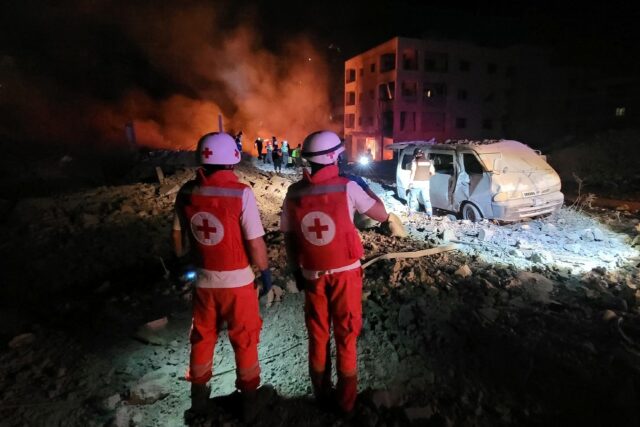Israeli Prime Minister Benjamin Netanyahu rejected a ceasefire in Lebanon on Tuesday, with the Israeli army launching further strikes on Beirut on Wednesday morning.
Netanyahu tells Macron he opposes ceasefire
Israeli Prime Minister Benjamin Netanyahu said on Tuesday that he is against agreeing to a “unilateral ceasefire” in Lebanon during a conversation with French President Emmanuel Macron, his office said in a statement. Netanyahu said, his office said in a statement:
“The Prime Minister said in the conversation that he is opposed to a unilateral ceasefire, which does not change the security situation in Lebanon, and which will only return it to the way it was.”
Macron stepped up pressure on Israel to honour UN decisions, telling his cabinet that “Netanyahu should not forget that his country was created by a UN decision,” a participant in the meeting told AFP.
The resolution in question was a resolution adopted in November 1947 by the UN General Assembly on a plan to partition the territory into separate Jewish and Arab states. Macron said at a closed-door meeting at the Elysee Palace, words quoted by a participant in the meeting who wished not to be named:
“Therefore, this is not the time to disregard the decisions of the UN.”
Tensions have risen between Netanyahu and Macron, with the French leader insisting last week that halting the export of weapons used by Israel in Gaza and Lebanon was the only way to stop the conflicts.
France has also repeatedly condemned Israeli shelling of UN peacekeepers in southern Lebanon, which includes a French contingent.
EU says calls for Lebanon ceasefire have not been heard
A European Union official lamented the failure of efforts to broker a truce in the Middle East, saying fighting between Israel and Hezbollah is making it difficult to implement wide-ranging reforms in Lebanon and create conditions for attracting international financial aid.
EU Crisis Management Commissioner Janez Lenarčič told The Associated Press in Manila late Tuesday that stalled reforms in Lebanon include electing a new president, establishing a working government and signing an agreement with the International Monetary Fund. Lenarčić said:
“It’s difficult to see that happening in these circumstances when Lebanon is under such a strain. That’s one of the reasons why we’re calling for a ceasefire, so as to allow Lebanon to organise itself so that it can benefit from all the funding which is out there. I regret that we have not been heard.”
The EU is also extremely concerned about the killing of civilians in the fighting between Israel and Hezbollah. He also added:
“This collateral damage is simply unacceptable.”
Israel strikes Beirut
At least one Israeli strike hit Beirut’s southern suburbs early on Wednesday morning, eyewitnesses told Reuters, hours after the US said it opposed the scale of Israeli attacks on the city amid a rising death toll and fears of a wider regional escalation.
Reuters witnesses heard two explosions and saw plumes of smoke coming from two different neighbourhoods.
It came after Israel issued an evacuation order early Wednesday that mentioned only one building.
In recent weeks, the Israeli military has struck Beirut’s southern suburbs, a Hezbollah stronghold, without prior warning, or warned of a strike on a single neighbourhood while launching larger strikes itself.
The Israeli military said it struck an underground Hezbollah weapons depot in the southern Beirut suburb of Dahiya. The Israeli military said:
“Prior to the strike, numerous steps were taken to mitigate the risk of harming civilians, including advancing warnings to the population in the area.”
According to the UN refugee agency, the Israeli military’s evacuation orders affected more than a quarter of Lebanon two weeks after Israel launched an incursion into the south of the country aimed at what it said was to push back Hezbollah.
Some Western countries are pushing for a ceasefire between the two neighbours as well as in the Gaza Strip, although the US says it continues to support Israel and is sending an anti-missile system and troops.
Israeli strikes in Lebanon over the past year have killed at least 2,350 people, injured about 11,000 and displaced more than 1.2 million people, according to the health ministry.
